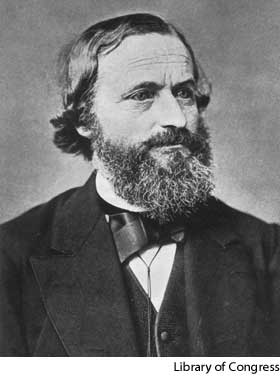- Gustav Kirchhoff
Infobox_Scientist
name = Gustav Robert Kirchhoff
 |300px
|300px
image_width = 200px
caption = Gustav Kirchhoff
birth_date = birth date|1824|3|12|df=y
birth_place =Königsberg ,East Prussia
death_date = death date and age|1887|10|17|1824|3|12|df=y
death_place =Berlin ,Germany
residence =Germany
nationality = German
field =Physicist
work_institutions =University of Berlin University of Breslau University of Heidelberg
alma_mater =University of Königsberg
doctoral_advisor =Franz Ernst Neumann
doctoral_students =Max Noether Ernst Schröder
known_for =Kirchhoff's circuit laws Kirchhoff's law of thermal radiation
prizes =Rumford medal
religion =
footnotes =Gustav Robert Kirchhoff (
March 12 ,1824 –October 17 ,1887 ) was a Germanphysicist who contributed to the fundamental understanding ofelectrical circuit s,spectroscopy , and the emission ofblack-body radiation by heated objects. He coined the term "black body" radiation in 1862, and two sets of independent concepts in both circuit theory and thermal emission are named "Kirchhoff's laws " after him. TheBunsen-Kirchhoff Award for spectroscopy is named after him and his colleague,Robert Bunsen .Life and work
Gustav Kirchhoff was born in
Königsberg ,East Prussia , the son of Friedrich Kirchhoff, a lawyer, and Johanna Henriette Wittke. He graduated from the AlbertusUniversity of Königsberg in 1847 where he attended the mathematico-physical seminar directed byFranz Ernst Neumann and Friedrich Julius Richelot. He married Clara Richelot, the daughter of his mathematics professor Richelot. In the same year, they moved toBerlin , where he stayed until he received a professorship atBreslau .Kirchhoff formulated his circuit laws, which are now ubiquitous in
electrical engineering , in 1845, while still a student. He completed this study as a seminar exercise; it later became his doctoral dissertation. He proposed his law of thermal radiation in 1859, and gave a proof in 1861. He was called to theUniversity of Heidelberg in 1854, where he collaborated in spectroscopic work with Robert Bunsen. Together Kirchhoff and Bunsen discoveredcaesium andrubidium in 1861. AtHeidelberg he ran a mathematico-physical seminar, modelled on Neumann's, with the mathematician Leo Koenigsberger. Among those who attended this seminar wereArthur Schuster andSofia Kovalevskaya . In 1875 Kirchhoff accepted the first chair specifically dedicated totheoretical physics atBerlin .In 1862 he was awarded the
Rumford Medal for his researches on the fixed lines of the solar spectrum, and on the inversion of the bright lines in the spectra of artificial light.He contributed greatly to the field of spectroscopy by formalizing three laws that describe the spectral composition of
light emitted by incandescent objects, building substantially on the discoveries ofDavid Alter andAnders Jonas Angstrom (see also:spectrum analysis )Kirchhoff died in 1887, and was buried in the St Matthäus Kirchhof Cemetery in
Schöneberg ,Berlin , only a few meters from the graves of theBrothers Grimm .Kirchhoff's three laws of spectroscopy:
#A hot solid object produces light with a continuous spectrum.
#A hot tenuous gas produces light withspectral line s at discretewavelength s (i.e. specific colors) which depend on the energy levels of the atoms in the gas. ("See also:"emission spectrum )
#A hot solid object surrounded by a cool tenuous gas (i.e. cooler than the hot object) produces light with an almost continuous spectrum which has gaps at discrete wavelengths depending on the energy levels of the atoms in the gas. ("See also:"absorption spectrum )Kirchhoff did not know about the existence of energy levels in atoms. The existence of discrete spectral lines was later explained by the
Bohr model of the atom, which helped lead toquantum mechanics .ee also
*
Kirchhoff's circuit laws
*Kirchhoff equations
*Piola-Kirchhoff stress tensor
*Kirchhoff's law of thermal radiation
*Kirchhoff Institute of Physics
*Spectroscope
*Kirchhoff's theorem References
*
*
*Persondata
NAME= Kirchhof, Gustav Robert
ALTERNATIVE NAMES=Kirchhoff
SHORT DESCRIPTION=Physicist
DATE OF BIRTH= birth date|1824|3|12|df=y
PLACE OF BIRTH=Königsberg ,East Prussia
DATE OF DEATH= death date|1887|10|17|df=y
PLACE OF DEATH=Berlin ,Germany
Wikimedia Foundation. 2010.
